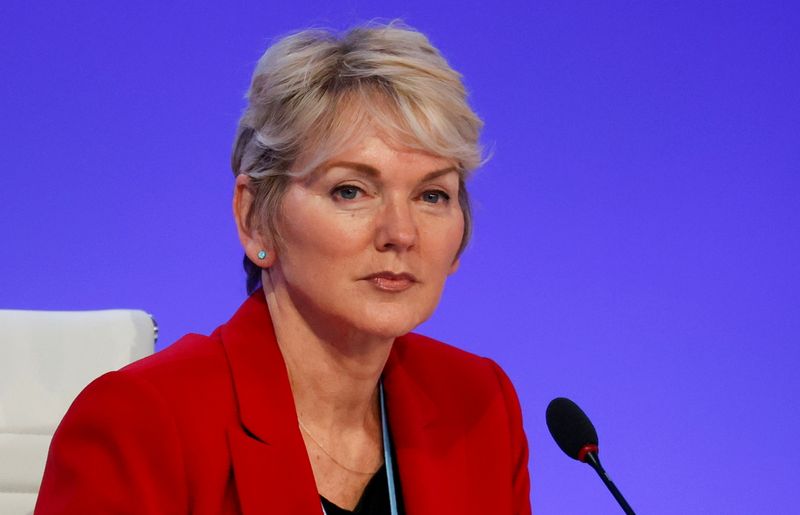By Timothy Gardner
WASHINGTON (Reuters) - U.S. Energy Secretary Jennifer Granholm on Friday suggested that the Biden administration has little power to push the country's oil producers to boost output in an effort to lower rising fuel costs.
"Would that I had the magic wand on this," Granholm told Bloomberg TV, laughing in a response to a question on what her plan was to raise U.S. oil output. "That is hilarious," she added.
U.S. oil output is expected to fall 260,000 barrels per day (bpd) to about 11 million bpd in 2021 as production is slow to recover from the pandemic even as demand rises, the Energy Information Administration, an independent arm of the Department of Energy, said this month.
That output would be 60,000 bpd lower the EIA previously forecast. Output is expected to rebound in 2022 to 11.7 million bpd, but fall short of pre-pandemic record output of nearly 13 million bpd in November 2019.
Granholm said oil is a global market "controlled by a cartel, the cartel is called OPEC." President Joe Biden's administration has been pushing OPEC and its allies, known as OPEC+, to boost production so as not to impair the global economic recovery. But this week OPEC+ stuck to a plan to only raise output gradually, and Brent oil prices marched higher on Friday to nearly $83 a barrel.
"If 80-plus dollars a barrel doesn't incentivize oil companies to get off the sidelines, I'm not sure what will," Granholm said. She rejected the idea that Biden administration restrictions on drilling leases on public lands had caused oil and gas companies to slow output, adding that they are not acting on more than 7,000 leases on public and private lands that they have.
"They are sitting on them, they're stockpiling these leases, why is that?" Granholm said.
U.S. shale oil producers Chevron Corp (NYSE:CVX) and Exxon Mobil Corp (NYSE:XOM) signaled this week https://www.reuters.com/business/energy/us-shale-producers-signal-more-oil-coming-opec-counts-restraint-2021-11-03 their reluctance to pump more oil this year could be nearing an end as they plan to increase spending next year.
Granholm reiterated that tapping the Strategic Petroleum Reserve was being considered by Biden as a lever that could help cool prices.

She added that high fuel prices, such as those seen in Europe, were not acceptable in the United States, even if some people believe such prices could help drive a transition to green energy.
"The president does not want to see the price of fuel hurt and pinch real people," Granholm said, pointing out that some poor people spend up to 30% of their monthly incomes on fuels.